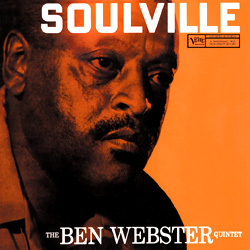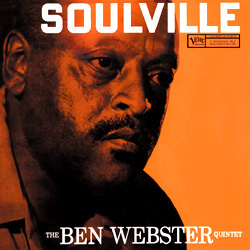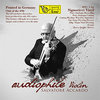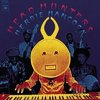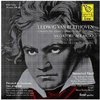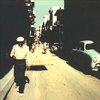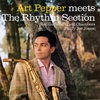Soulville is quintessential Ben Webster: intimate, tender and endlessly expressive. Webster was internationally recognized as one of jazz's elder statesman when he recorded this album in 1957, but the youthful fire that had marked his playing with the Duke Ellington Orchestra two decades earlier was undiminished. Leading a stellar combo through a program consisting mostly of vintage pop tunes, the great tenor saxophonist is at his absolute peak here.
“Ben Webster”, wrote the jazz historian J. E. Behrend, “was two men in one: in fast pieces he was a musician with a throaty, croaking vibrato, while in slow ones he was a master of erotic and intensive ballades.” In this compilation of both his own works and standard numbers with the promising title of Soulville, “Big Ben” shows the gentle and the rougher sides of his nature.
No session in which black jazz musicians take part would be worth its salt without an own good and honest opening blues number, as the first two tracks on this LP go to show. But in the classic hits Lover Come Back To Me and Makin’ Whoopee too, the very heartbeat of the Age of Swing can be easily discerned. And it’s well worth taking a look at the small print on the cover too. Joining the prominent members of the Peterson trio are Herb Ellis and Stan Levey no less! It’s hardly necessary to add that the sound reproduction on this VERVE recording made in the 1950s is of the very highest quality.
The by turns grizzled and vaporous-toned Webster really hit his stride on the Verve label. During a stretch from roughly 1953-1959, the Ellington alumnus showcased his supreme playing with both combos and string sections, swingers and ballads -- and lurking beneath his blustery and hulking sound were solo lines brimming with sophistication and wit. This 1957 date with the Oscar Peterson Trio is one of the highlights of that golden '50s run. After starting off with two bluesy originals -- the slow burning title track and gutsy "Late Date" -- Webster gets to the heart of things on five wistful ballads: Here, his exquisitely sly "Makin' Whoopee" is only outdone by an incredibly nuanced "Where Are You." Providing sympathetic counterpoint, Peterson forgoes his usual pyrotechnics for some leisurely compact solos; his cohorts -- guitarist Herb Ellis, bassist Ray Brown, and drummer Stan Levey -- are equally assured and splendid. And ending the set with flair, Webster takes over the piano for three somewhat middling yet still impressive stride and boogie-woogie-styled numbers (these are his only piano recordings). Newcomers shouldn't hesitate to start here.
1. Soulville
2. Late Date
3. Time on my Hands
4. Lover Come Back to Me
5. Where Are You
6. Makin' Whoopee
7. Ill Wind
Are your records completely analogue?
Yes! This we guarantee!
As a matter of principle, only analogue masters are used, and the necessary cutting delay is also analogue. All our cutting engineers use only Neumann cutting consoles, and these too are analogue. The only exception is where a recording has been made – either partly or entirely – using digital technology, but we do not have such items in our catalogue at the present time
Are your records cut from the original masters?
In our re-releases it is our aim to faithfully reproduce the original intentions of the musicians and recording engineers which, however, could not be realised at the time due to technical limitations. Faithfulness to the original is our top priority, not the interpretation of the original: there is no such thing as a “Speakers Corner Sound”. Naturally, the best results are obtained when the original master is used. Therefore we always try to locate these and use them for cutting. Should this not be possible, – because the original tape is defective or has disappeared, for example – we do accept a first-generation copy. But this remains an absolute exception for us.
Who cuts the records?
In order to obtain the most faithful reproduction of the original, we have the lacquers cut on the spot, by engineers who, on the whole, have been dealing with such tapes for many years. Some are even cut by the very same engineer who cut the original lacquers of the first release. Over the years the following engineers have been and still are working for us: Tony Hawkins, Willem Makkee, Kevin Gray, Maarten de Boer, Scott Hull, and Ray Staff, to name but a few.
At the beginning of the ‘90s, in the early days of audiophile vinyl re-releases, the reissue policy was fairly straightforward. Companies such as DCC Compact Classics, Mobile Fidelity, Classic Records and others, including of course Speakers Corner, all maintained a mutual, unwritten code of ethics: we would manufacture records sourced only from analogue tapes.
Vinyl’s newfound popularity has led many other companies to jump on the bandwagon in the hope of securing a corner of the market. Very often they are not so ethical and use every imaginable source from which to master: CDs, LPs, digital files and even MP3s.
Even some who do use an analogue tape source employ a digital delay line, a misguided ’80s and ‘90s digital technology that replaces the analogue preview head originally used to “tell” the cutter head in advance what was about to happen musically, so it could adjust the groove “pitch” (the distance between the grooves) to make room for wide dynamic swings and large low frequency excursions. Over time analogue preview heads became more rare and thus expensive.
So while the low bit rate (less resolution than a 16 bit CD) digital delay line is less expensive and easier to use than an analogue “preview head”, its use, ironically, results in lacquers cut from the low bit rate digital signal instead of from the analogue source!
Speakers Corner wishes to make clear that it produces lacquers using only original master tapes and an entirely analogue cutting system. New metal stampers used to press records are produced from that lacquer. The only exceptions are when existing metal parts are superior to new ones that might be cut, which includes our release of “Elvis is Back”, which was cut by Stan Ricker or several titles from our Philips Classics series, where were cut in the 1990s using original master tapes by Willem Makkee at the Emil Berliner Studios. In those cases we used only the original “mother” to produce new stampers.
In addition, we admit to having one digital recording in our catalogue: Alan Parsons’ “Eye in the Sky”, which was recorded digitally but mixed to analogue tape that we used to cut lacquers.
In closing, we want to insure our loyal customers that, with but a few exceptions as noted, our releases are “AAA”— analogue tape, an all analogue cutting system, and newly cut lacquers.
